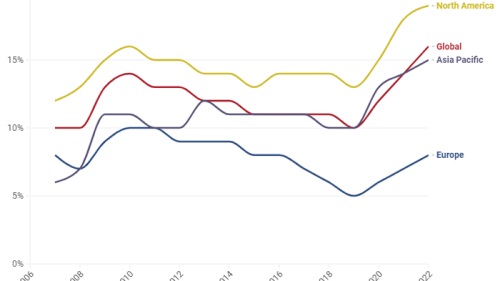Despite reports that CEOs are growing less optimistic and companies are cutting spending due to the uncertainty around the approaching “fiscal cliff,”—the package of drastic spending cuts and tax increases poised to go into effect January 2, unless Congress and the Administration agree on an alternative, other economic indicators have been largely positive. In the past few months, unemployment has fallen, the housing market has strengthened, gas prices have fallen, and consumer confidence is at a five-year high. Would those positive indicators be negated by the economic shock of falling off the cliff, and plunge the U.S. back into recession? 
Analysts at Cassidy Turley say a legislative compromise is the most likely scenario, which would allow the economy to continue along a projected path of about 2 percent annual GDP growth. But if no compromise is reached, and the fiscal cliff is breached, Thorpe said their forecast for 2013 would be “bleak” with a loss of 800,000 jobs, an unemployment rate back up to almost 9 percent, negative GDP, and the possibility of a new recession.
“Businesses are certainly tapping on the brakes on some things, being more cautious, whether it’s capital investment or hiring,” says Kevin Thorpe, chief economist at Cassidy Turley. “But the economy’s been remarkably resilient. It is a fair question: What might companies be doing if there wasn’t this uncertainty?”
Industry-Specific Impact
The impact to certain industries could be significant. The Aerospace Industry Association forecasts as many as 2 million jobs could be lost if the fiscal cliff is not avoided, while an American Institute of Architects report says job losses in the design and construction industry could reach 66,500.
The domestic office sector slowed in the third quarter in anticipation of the national elections and the fiscal cliff, according to an October Cassidy and Turley report. David Lynn, chief executive of Lynn Capital Management and former managing director and head of research and investment strategy at Clarion Partners, says suburban office markets may be “disproportionately affected” while the 24-hour gateway cities should be more stable.
Hotels could follow a similar pattern, as Lynn sees a weakening dollar increasing international travel to key U.S. destinations, but possibly not enough to offset the already weak domestic business travel in secondary markets.
Cassidy Turley forecasts short-term strength in both retail and the industrial sectors, but if consumer confidence were to fade, Lynn says that is likely to hit retail “immediately” which would eventually impact industrial/manufacturing, saying “industrial follows retail.”
“Some businesses are worried,” says Thorpe. “Others see an opportunity to be aggressive.” For example, Thorpe says the Family Dollar retail chain plans to open another 500 stores in 2013, similar to this year, while Whole Foods is opening 70 stores in the next two years.
Residential, particularly multi-family, would likely be one of the least impacted areas, according to Thorpe. “For the past few years, housing has been a drag,” says Thorpe. “Demographics alone should drive some home construction.” He also says multifamily has been underbuilt, which could keep demand elevated for the next few years.
Regional Effects
According to theCassidy Turley report, some urban areas are more vulnerable to the potential federal spending cuts. “The D.C. region has the most obvious bull’s-eye on it around the risk of sequestration,” said Thorpe.
Washington, D.C., Knoxville, Tenn., Charleston, S.C., San Antonio, Texas, and St. Louis all depend on federal spending for more than 25 percent of their local gross domestic product. According to the report, Washington has the most exposure of any city at 40 percent.
Other large cities that depend on federal spending for 10-20 percent of their local economy include Phoenix, Indianapolis, Atlanta, Denver, and Chicago.
Until a compromise is reached, says Thorpe, spending in those cities will likely be stalled into January, and won’t recover overnight.
Much Ado About Nothing?
However, Peter Linneman, chief economist of NAI Global and an emeritus professor at Wharton School of the University of Pennsylvania, has compared the fiscal cliff to “Y2K with a footnote” referring to concern in 1999 that computers and software might fail when their internal clocks switched over to 2000. Linneman says there will be a flurry of activity around getting the compromise in place, but little serious reform. “The real loss,” says Linneman, “is not doing things at the optimal time.”
Linneman says the impact of Superstorm Sandy may be more tangible and have a greater short-term economic impact, at least on the East Coast. “The storm eliminated real resources. Even where insurance covers the damages, that money could have been better invested elsewhere.”
“Deals are getting done,” says ULI Senior Fellow Stephen Blank. “Rates are low; no one is triggering the ‘material adverse effect’ clause.”
Lynn predicts more of a continuation of the trends we’ve seen since the recession began. He says companies are opting for shorter-term leases and trying to pack more employees in to a smaller amount of square footage using telecommuting, cubicles, and hoteling. “Offices are a thing of the past for these new corporates,” says Lynn. He also sees continued strength in transit-oriented residential properties as energy costs continue to rise.







